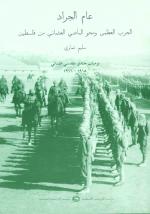Year of the Locust: The Great War and the Erasure of Palestine's Ottoman Past
The hero of our story is Ihsan Hasan al-Turjman (1893-1917), an ordinary recruit in the Ottoman military headquarters in Jerusalem. His life was short and uneventful, having served as a clerk in the Logistics Department (Manzil), and briefly as a foot soldier in Nablus and Hebron, but his observations on the manner in which the succession of military events impacted his relationship to his city and his nation, are without parallel. The power of these diaries lie in their exposure of the texture of daily life, long buried into the political rhetoric of nationalist discourse, and in the restoration of a world that has been hidden by subsequent denigration of the Ottoman past—the life of communitarian alleys, of obliterated neighborhoods, of heated political debates projecting possibilities that no longer exist, and the voices of street actors silenced by elite memoirs: soldiers, peddlers, prostitutes, and vagabonds. By the third year of the war the diaries project a desperate search for normalcy daily life — normalcy that was experienced in pre-war Ottoman Palestine, but seems to have eluded its citizens for the next hundred years.

